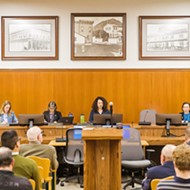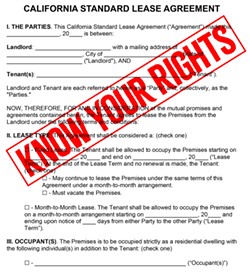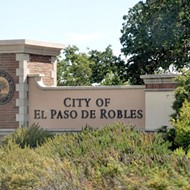[
{
"name": "Newsletter Promo",
"id": "NewsletterPromo",
"class": "inlineCenter",
"insertPoint": "4",
"component": "15264767",
"requiredCountToDisplay": "0"
},
{
"name": "Ad - Medium Rectangle CC01 - 300x250 - Inline Content",
"class": "inlineCenter",
"insertPoint": "8",
"component": "15582119",
"requiredCountToDisplay": "12"
},{
"name": "Ad - Medium Rectangle LC01 - 300x250 - Inline Content",
"class": "inlineCenter",
"insertPoint": "18",
"component": "15582122",
"requiredCountToDisplay": "22"
},{
"name": "Ad - Medium Rectangle 9 - 300x250 - Inline Content",
"class": "inlineCenter",
"insertPoint": "28",
"component": "15582121",
"requiredCountToDisplay": "32"
}]
Is this the year you find yourself out of the "loving" embrace of dorm life and cafeteria food and into the cold, cruel world of the San Luis Obispo rental market and the "freedom" to take care of your own bills, cooking, and cleaning? If it is, you already know that rent is too damn high. No point in dwelling on it. Everyone knows it, and nobody seems to know what to do about it.
What you may not know, however, is that you don't have to put up with living in a shithole, paying unreasonable rent increases, or doling out your life savings for ridiculous deposits.
Renters
For starters, it probably seems ridiculous, but landlords can legally charge application fees for the mere privilege of them considering you as a tenant. The collected fees are meant to process prospective tenants' applications, and in California, landlords can charge up to $52 per applicant, though they must be able to prove the fee is reasonably related to the landlord's actual cost of screening applicants—running background checks, credit ratings, and calling references. A fee of about $30 is more common, and it's important to understand that to charge the fee, a unit must be available. It's not like a landlord can just collect applications and pocket the fees. Wheee!
As you begin to apply for housing, you should also know that the Fair Employment and Housing Act (FEHA) makes it illegal to discriminate based on race, color, religion, sex, sexual orientation, national origin, familial status, disability, and source of income, including Section 8 vouchers.
Did you finally find a place? Congratulations! You should also know that as of July 1, 2024, a landlord cannot collect more than one month's rent as a deposit, so if someone's trying to charge you "first and last and a $200 cleaning deposit and a $25 key deposit," they're breaking the law. The only exception is for certain small landlords with no more than four dwelling units, who may collect two months' rent as a security deposit but then must hold it in trust (like stick it in a bank account and not spend it).
So, how do you end up forfeiting your deposit? If you vacate but still owe rent, if you leave the unit less clean than it was at move-in, if you've damaged it beyond normal wear and tear, if you made alterations and didn't return the unit to its original condition, or if you fail to restore personal property such as not returning keys, you can lose some or all of your deposit. If none of these circumstances occur, the landlord is required by law to return your entire deposit within 21 days.
If your deposit isn't returned or you don't agree with the deductions made, write your landlord a letter and keep a copy for your records. Photographically document evidence proving you've left the unit in good, clean condition. You may end up in mediation to get your deposit back.
As far as rent increases are concerned, as of Jan. 1, 2020, the Tenant Protection Act placed a cap on annual increases equal to 5 percent plus inflation, or 10 percent—whichever is lower. The current rate of inflation is 2.9 percent, which means your rent shouldn't rise by more than 7.9 percent per year.
Obviously, the best protection against living in a dump is not moving into one, but let's say you're in a unit that suddenly doesn't have hot water, or you find yourself getting sick and discover black mold under the sink, or the roof begins leaking—these are things a landlord is required to remedy, and if they don't, you need to contact your local code enforcement office or health department. In San Luis Obispo, you should contact slocity.org/ask. A city code enforcement officer will inspect the unit with your consent, even if the landlord objects. FEHA also protects you from landlord retaliation for exercising your rights, such as reporting discrimination or substandard conditions.
Landlords
Keep in mind, landlords have rights too, and for them, this transaction is a business. They're in it for the money. You may hear from other renters, "Rent isn't considered late until after the 5th of the month," but that's a myth. If your lease says rent is due on the 1st, it's late on the 2nd unless your rental agreement indicates otherwise.
Landlords can evict tenants for a variety of reasons. Fault evictions include nonpayment of rent, some other breach of lease terms (like bringing pets into a no-pets rental), turning the place into a dump, using it for unlawful purposes, criminal activity occurring on the premises, or refusal to allow lawful entry. A landlord must give written notice to enter 24 hours prior.
No-fault evictions include the owner deciding to move into the unit, the owner deciding to remodel, the intent to demolish the unit, the decision to remove the unit from the rental market, or if a government agency decides the unit isn't habitable.
There are some weird laws out there too. For instance, a landlord must disclose to a prospective tenant of any death and the manner of death at the rental unit if it occurred within the last three years.
Resources
Worried about sexual offenders nearby? Visit meganslaw.ca.gov. Don't get too freaked out, though. I put my address in and discovered 28 sex offenders live within a 2-mile radius of me.
A good local resource for more information is slocity.org/safehousing, and a good statewide resource is courts.ca.gov/documents/california-tenants-guide.pdf.
Welcome to independence! Δ
Contact Senior Staff Writer Glen Starkey at [email protected].
Latest in News
Readers also liked…
-

When the levee breaks: Oceano residents, county officials walk a tightrope of regulations to manage Arroyo Grande Creek, which some say led to the levee's failure in January
May 18, 2023 -

Cal Poly report highlights offshore wind's potential to spur green energy transition
Jun 8, 2023 -

Cal Poly students demand rent control, accountability for substandard housing from SLO City Council
Jun 22, 2023











